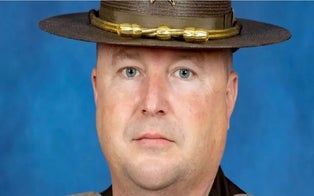TV reporter Serene Branson suddenly began speaking in gibberish during a live broadcast after the Grammy Awards and some medical experts say she most likely had some sort of neurological event. INSIDE EDITION reports.
Reporter Serene Branson suddenly began speaking gibberish during a live report after the Grammy Awards, sparking fears she was undergoing a medical crisis, possibly even a stroke.
The video went viral on YouTube, and users left comments like:
"She needs to see a neurologist," and, "This is very scary. She needs to get that checked out."
There was a look of bewilderment on Branson's face as she struggled to unscramble her words.
She's just 31 and reports for KCBS and KCAL in Los Angeles. She showed no sign of any problems in a live report just two nights earlier.
A station spokesman says Branson did not suffer a stroke and was not hospitalized. She was taken home by a friend after being checked by EMTs at the scene. There was an update on her condition last night:
"She wants us to know that she followed up with a visit to the doctor for some medical tests and Serene thanks everyone for their concern and good wishes and hopes to be back on the air very soon," said KCAL anchor Rick Garcia.
Now medical experts are weighing in with their opinions of what happened. On Good Morning America, Dr. Richard Besser noted a visible change in Branson's face:
"It looked to me like the two sides of her face weren't exactly symmetrical. There was a little difference in the crease on one side of the face and that's one of the things you would look for in someone who might be having a stroke," said Dr. Besser.
On the Today show, Dr. Nancy Snyderman told Matt Lauer, "When I first watched it, there was no doubt there was some kind of neurologic event. If you watch her eyes you can tell that she senses that something is not right."
Fox News medical contributor Dr. Marc Siegel tells INSIDE EDITION, "Some area of the brain kind of went into spasm, temporarily, causing her to have difficulty finding words."
Just last month 35-year-old anchorwoman Sarah Carlson from WISC-TV in Madison, Wisconsin, suffered an epileptic seizure during a live newscast.
Carlson is now back on the air and knows better than anyone what Branson was going through.
"I thought it was eerily similar, the look in her eyes even, and the way she spoke, they weren't real words, but she tried so hard to keep something coming out of her mouth," said Carlson.
While it's unclear what caused Branson's troubles, the American Stroke Association warns that medical attention within three hours of a possible stroke can be critical.
Make sure you know the signs of a stroke:
• Sudden numbness or weakness of the face, arm or leg, especially on one side of the body
• Sudden confusion, trouble speaking or understanding
• Sudden trouble seeing in one or both eyes
• Sudden trouble walking, dizziness, loss of balance or coordination
• Sudden, severe headache with no known cause






